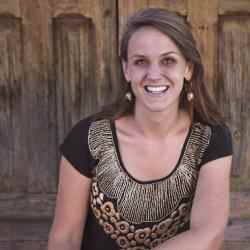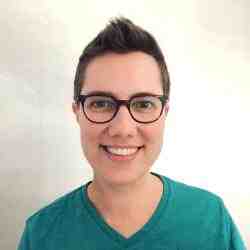Go Healthy! / Gondolkodj Egészségesen!
http://gondolkodjegeszsegesen.hu/Introduction
Márta Bácskai is changing the way holistic, child-centered health education is delivered to children and their families. She targets children, parents, and preschool teachers with a unique and comprehensive prevention program to encourage children to become conscious about their health. By centering her curriculum on various forms of self-expression and ensuring communication among all stakeholders, Márta is revolutionizing the way health knowledge and prevention is delivered to young children.
The New Idea
Márta founded Go Healthy! with the aim to equip preschool teachers and parents with a set of practical tools and methods based on games, arts (tales, music, dance, and handicrafts) and theatre pedagogy to more easily encourage children to express themselves and reach a deep level of self-definition, even at a young age. With her tools and methods, Márta is combatting the early onset of illness by providing new channels to health and success early on. For her, prevention and health education in preschool is the best way to eliminate any kind of illness in adulthood.
To maximize success, cooperation from preschool teachers and parents is essential. Márta supports a previously unexplored method of tripartite collaboration between children, parents and preschool teachers, in which all three work together to serve the “whole” child. Márta’s network of “ambassador” preschool teachers is responsible for expanding the program and managing the existing partnerships throughout Hungary. In seven years, Go Healthy! has worked with 1,350 preschools in Hungary and 250 in Transylvania and is in the process of expanding to other regions and neighboring countries.
The Problem
The situation of child health in Hungary is rapidly deteriorating. Life expectancy at birth is lower than in neighboring countries, morbidity reports have revealed that illnesses caused by lifestyle or environmental factors are presenting in childhood. Children frequently suffer from allergies, psychosomatic symptoms and eating disorders, and physical activity is on the decline. Moreover, as these children mature into their teens, hazardous behaviors of substance abuse, smoking, and drinking are becoming distressingly widespread.
The best way to protect children from illness or from turning to obsessive substances/activities is primary prevention. Primary prevention makes children aware of healthy lifestyle alternatives and teaches them how to recognize and reject harmful behaviors. Professionals specializing in prevention and health education concluded that merely passing on knowledge and information fail to yield the desired results. Instead, practical learning experience based on repetition and routine is essential to influence long-term behavior.
Children tend to develop their behavior patterns, norms, and life skills, especially health habits, before the age of seven. How the child develops during early childhood sets the stage for success in school and fostering character later in adolescence and adulthood. Therefore, primary prevention has the biggest effect on children’s health at this age. Since the development of a child is dependent on their family and preschool environment to age seven, it is of critical importance that both parents and preschool teachers form a communicative and cooperative relationship. Children bring the norms learned in their family to the preschool and bring home their preschool experiences.
Our ever-changing modern society is strongly shaping traditional family models. To ensure a normal standard of living, both parents usually work full-time. Due to the changes in family structures, there is a new paradigm of child-rearing emerging in Hungary; institutional development carried out by preschools is becoming very important. Children spend an average of eight hours per day in preschool, which is more time then spent with their families per year. While preschools cannot take on the role of families, they can help to fill gaps in comprehensive life education.
Parents think that the role of preschools is to prepare children for primary school by practicing reading, writing, and elementary algebra. However, preschools maintain a child-centered approach during early years, not an education-centered one. This discrepancy results in a gap between expectations and reality among parents and preschool teachers.
Responding to these socioeconomic changes, the Ministry of National Resources updated the National Core Curriculum of Preschool Pedagogy in 2010 The newer framework highlights that preventive health education and raising environmental consciousness are the key roles of preschools. It also stresses the role of games, arts and experiential learning in early childhood development as opposed to only formally educating children. However, there has been no tangible guidance on a national level for parents and preschool teachers—tools, practical methods, and trainings—provided by the government or any citizen organization (CO) about how to implement such a complex approach to health into the daily lives of children based on experiential learning, tripartite collaboration, and reflection on societal changes.
The Strategy
Márta is combatting this lack of societal structure around early childhood education with Go Healthy!. Go Healthy! is not just about prevention or the education of children, parents, and preschool teachers. The organization also focuses on bridging the gap between possessing health knowledge and living a healthy lifestyle. Márta began her work in 2006 in Hungary and saw rapid success, reaching 850 preschools. She is helping these target groups shift their mindsets to view the health of a child as a complex, holistic system. Márta believes this system only works well if mind, body, and soul are continually treated with equal attention. The same holds true for the seven aspects of health she has identified and defined in her programing: Nutrition, Social-Emotional Development, Environmental Consciousness, Culture & Arts, Tolerance, Physical Health and Hygiene—the core building blocks which guide the program. To tap into a child’s innate capacity for imagination and creativity, Márta uses methods of self-expression (arts, games, and drama) to relay health concepts. She also uses modern technology to facilitate online interaction between parents and preschool teachers on social media platforms.
Márta’s strategy builds on four pillars: (i) targeting children in preschools by engaging preschool teachers (ii) targeting a child’s family life outside the preschools with leisure activities for parents, families, and children organized by Go Healthy! (iii) pursuing experts to develop and spread the program, and (iv) reforming the college education curriculum of preschool teachers by inserting the program.
Márta first builds close working relationships with preschools and preschool teachers. She is redefining the role of the preschool teacher as one that works closely with both students and parents. The connections she creates result in tripartite cooperation, where all parties influence each other’s mindsets, habits and overall well-being. Furthermore, children are, in addition to the tripartite cooperation, communicating with each other in new ways by means of free expression. Márta promotes this as she feels strongly that her method cultivates tolerance and empathy. Via Go Healthy!, preschool teachers from around the country come together to build a strong community. They share experiences, learn from each other, gain inspiration from new topics, methods and tools provided by experts, and then bring all the mastered abilities back to the groups and to parents. The Go Healthy! approach guarantees quality content based on establishing regional nodes, a network of preschool teacher “ambassadors”. Currently there are 42 specially-selected ambassadors who are trained to nationally represent Go Healthy!, spreading Márta’s approach by building smaller communities of teachers instead of only one center in Budapest.
Márta has introduced three types of accredited vocational trainings for preschool teachers: theatre pedagogy, music therapy and Tales Told Differently. Also, with the purpose of further inspiring preschool teachers and providing concrete guidance, Márta has developed a health education curriculum. The curriculum, in cooperation with external experts, contains a detailed yearly program for preschools to deepen the Go Healthy! approach.
The next step builds on previous results, by allowing preschool teachers to communicate learning’s with families. Márta believes that directly addressing parents, children, and families together through camps, clubs, workshops and events is a less intense form of impacting them. Márta provides quality leisure activities in a dynamic and interactive manner to develop a complex understanding of health through the Go Healthy! approach. In addition, she created the Health Package, a booklet covering the seven facets of health with interesting, educative articles, advice from experts, and product samples from partnering companies. The Health Package helps parents become more conscious in parenting, and inspires preschool teachers with relevant topics. Every year 55,000 packages are given to parents of first-year children on national Go Healthy! day. Here children, parents, and preschool teachers spend one day together to strengthen their relationships.
Márta then cooperates with well-acknowledged professionals from the fields of pedagogy, music, drama pedagogy, tales, puppetry, handicrafts, dietetics, and psychology. Initially, she engaged such stakeholders with her vision and passion because they were all aware of the socioeconomic changes in society and saw the demand for such a complex health program. Márta also engages “Friends” of Go Healthy! who are credible, well-known Hungarians of different backgrounds. Together with professional experts, Marta engages and influences other people to live healthily using the Go Healthy! mindset.
Finally, Márta aims to implement the Go Healthy! approach in colleges where preschool teachers are trained in order to embed her program into the national higher education system. These are going to be modular types of courses, where the holistic mindset of the program would also be passed on to students with practical know-how. This will guarantee a larger uptake, as preschool teachers trained in this methodology will take it with them to their teaching environments after graduation.
At the end of 2012, Go Healthy! was invited to have its office seated in the Millenáris building, one of the biggest national cultural centers in Hungary. Currently, Márta has reached 1,350 partner preschools (both private and public) out of 4,336 in the country. Go Healthy! has been present in 250 Hungarian ethnic minority preschools in Transylvania and Romania since 2011. In five years, Márta aims to reach every preschool in Hungary, and in ten years she will expand throughout Europe. She plans to introduce a Go Healthy! trademark, certification, products, and services that credibly represent Go Healthy! values. The National Institute for Food and Nutrition Science supports this initiative, and she is partnering with companies who share similar values about health and would like to directly contribute to prevention and health education in the long-term as part of the company’s philosophy. This would be a huge step toward sustainability, along with other opportunities to create products or services independent of philanthropic investments. In addition, Márta would like to build an impact measurement system to systematically track program outcomes on children, parents and preschool teachers.
The Person
During childhood, Márta suffered from obesity. She moved from Hungary to France with her family when she was seven years old, where she experienced new motivation to fight back against being bullied and judged by how she looked. Márta courageously asked her family to support her in losing weight, and they took her to see a physician. The physician offered a holistic approach, which caused Márta and her family to recognize that simply focusing on dieting and nutrition is not enough to lead a healthy life: the solution is also nurturing mind, body, and soul. Owing to this life-changing experience, Márta succeeded in losing weight and developed her own holistic definition about a healthy lifestyle. She empowered her family members and peers to be conscious of their health from an all-encompassing perspective. At the age of thirteen, Márta decided to use her experience to work on issues of child health, to help prevent obesity or illness related to unhealthy life choices among children. She became profoundly passionate about passing on the experiences and learning points she lived through.
Márta studied economics in college and traveled abroad to work in marketing after graduation. She learned a lot about entrepreneurship, perseverance, networking, and creativity from inspiring mentors and businessmen. However, Márta realized that the world of business was not one in which she pictured herself. She returned to Hungary and began a new phase of her life.
Márta let her childhood mission of helping children drive her forward as she made her dream a reality. Her background was also in the arts: she had grown up in a family of teachers and artists, and her grandfather was a pioneer of amateur acting in Hungary. Therefore, deeply influenced by drama pedagogy, Márta wanted to let children “act out what they have inside.” In 2005, she began intense market research on the needs of stakeholders involved in child health to be certain her plans for the program were feasible and driven by real demand. Finally, the idea of a holistic health education program for preschool children, reshaping the traditional treatment-focused model into a preventive one, was founded when Go Healthy! was introduced to preschools.




